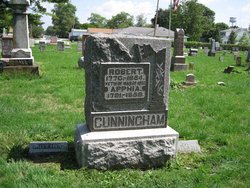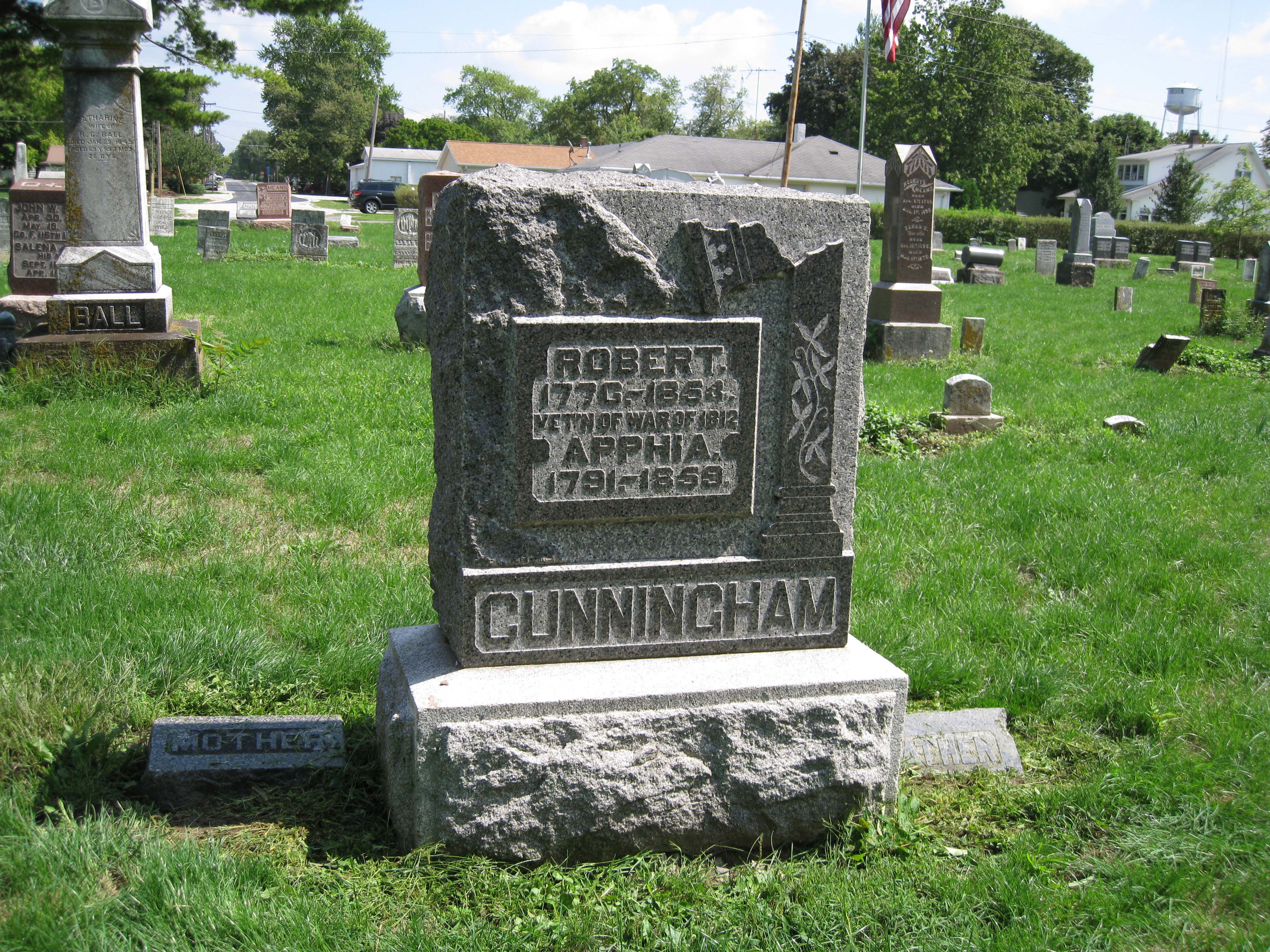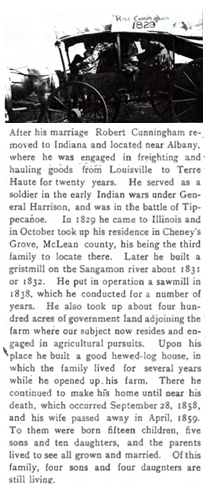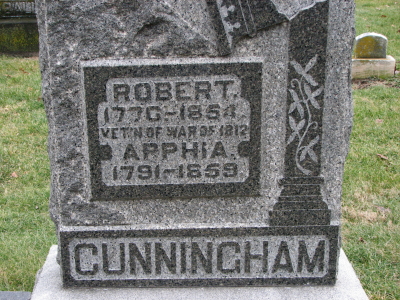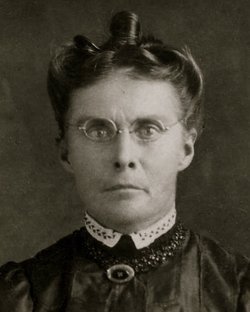Private , Capt . John Norris's Company of Infantry, Lieut. - Col. Josepl; Bartholomew's Battalion, Indiana Militia, Sept. n, 1811 to Nov. 24, 18 m's (In Battle of Tippecanoe, Nov. 7, 1811
The man who did most to "settle" Cheney's Grove and make life comfortable here was old Robert Cunningham, who came here from Clarke County, Ind., in 1829, where he had lived twenty years. He had done good service under Harrison in the War of 1812, and was present at the battle of Tippecanoe.
He took up 400 acres of land, rightly judging that his family would want nearly as much as that. He built a log house in the north east corner, and went to work making a farm with the aid of his boys. Three or four years after (we are sorry the date cannot be accurately established), he built the first and only water grist-mill ever built on the Sangamon River in McLean County. It was a curiosity in its way, and if such a mill could now be exhibited at Bloomington, bolts, bins, stones and all, it would make a larger return of shekels to its owner, at 5 cents a sight, than it would to be run as a merchant-mill. There was probably not a sawed board or stick in it; in fact, no sawing was being done yet in this part of the county. It is evident that sawing was not in demand, or he would have put up a saw-mill instead.
His "kit" of millwright tools to build it consisted of an ax, adz, jackplane, drawing-knife, and possibly a jack-knife, hammer and saw. Most of the work was done with the three former-named implements. The building was of logs, and it is believed he did every bit of the work on it, except raising the logs, himself. The stones were the common prairie boulders, cut down to get about two feet face on them. The floors, meal-bins, flume and all other "nice work" were puncheons, split out and dressed down to match. The latter did not always "hold water", and he had to "dust" it down with gravel, very frequently, to keep the water from running through the widening cracks. The wheels were made out of the same handy puncheons and the bolting-chest similarly. For a time, he had no elevator to carry the ground matter up to the bolt, and it was lugged up in the half-bushel and emptied on a platform _ the original Saybrook platform, it may be _ where a low-priced boy (the older ones had to be kept at work on the farm) sat hour after hour poking the product of the stone into the upper end of the bolt. This was business for the boys, and it will not be doubted when they say they sometimes got very tired of it. No smut-machine or middlings-purifier cumbered up the old mill; but the people esteemed it a decided improvement over pounding the grain in a mortar.
There was sufficient water to run about six months in the year, and, in 1838, he built a saw-mill, with the old-fashioned gate-saw, which, in flush times of water, would go up one minute and down the next. The rainy season of 1844, the stream was too high, during a great portion of the spring and summer, to run the mill, as indeed the long-continued rains prevented almost all labor; planting, tilling and travel were impeded, and it was one of the most discouraging years the old settlers ever knew. Mr. Cunningham continued to run these mills for about fifteen years and until Mr. Blakesley built the old stream-mill.
Mr. and Mrs. Cunningham were the parents of fifteen children, all of whom grew up, married and had families of their own, though none of them seemed to have been blessed by Providence with the same number. All of them lived around here for a while, and four still live in McLean County. Eleven are still living. The names of these children, ten daughters and five sons, together with the number of children each has been the parent of, are here given, and until someone in McLean County can show a better record, Saybrook will claim the championship for the Cunningham's: Sarah, 12; Phoebe, 6; Anna, 5; Mary, 9; Thomas, 6; Jesse, 3; Abby, 7; Fairly, 8; King Solomon, 6 (he had only one wife); Sardelia, 6; Emeline, 4; William E., 8; Jeremiah, 5; Aphia, 5; Robert, 6. Total 96
"Good Old Times of McLean County"
Private , Capt . John Norris's Company of Infantry, Lieut. - Col. Josepl; Bartholomew's Battalion, Indiana Militia, Sept. n, 1811 to Nov. 24, 18 m's (In Battle of Tippecanoe, Nov. 7, 1811
The man who did most to "settle" Cheney's Grove and make life comfortable here was old Robert Cunningham, who came here from Clarke County, Ind., in 1829, where he had lived twenty years. He had done good service under Harrison in the War of 1812, and was present at the battle of Tippecanoe.
He took up 400 acres of land, rightly judging that his family would want nearly as much as that. He built a log house in the north east corner, and went to work making a farm with the aid of his boys. Three or four years after (we are sorry the date cannot be accurately established), he built the first and only water grist-mill ever built on the Sangamon River in McLean County. It was a curiosity in its way, and if such a mill could now be exhibited at Bloomington, bolts, bins, stones and all, it would make a larger return of shekels to its owner, at 5 cents a sight, than it would to be run as a merchant-mill. There was probably not a sawed board or stick in it; in fact, no sawing was being done yet in this part of the county. It is evident that sawing was not in demand, or he would have put up a saw-mill instead.
His "kit" of millwright tools to build it consisted of an ax, adz, jackplane, drawing-knife, and possibly a jack-knife, hammer and saw. Most of the work was done with the three former-named implements. The building was of logs, and it is believed he did every bit of the work on it, except raising the logs, himself. The stones were the common prairie boulders, cut down to get about two feet face on them. The floors, meal-bins, flume and all other "nice work" were puncheons, split out and dressed down to match. The latter did not always "hold water", and he had to "dust" it down with gravel, very frequently, to keep the water from running through the widening cracks. The wheels were made out of the same handy puncheons and the bolting-chest similarly. For a time, he had no elevator to carry the ground matter up to the bolt, and it was lugged up in the half-bushel and emptied on a platform _ the original Saybrook platform, it may be _ where a low-priced boy (the older ones had to be kept at work on the farm) sat hour after hour poking the product of the stone into the upper end of the bolt. This was business for the boys, and it will not be doubted when they say they sometimes got very tired of it. No smut-machine or middlings-purifier cumbered up the old mill; but the people esteemed it a decided improvement over pounding the grain in a mortar.
There was sufficient water to run about six months in the year, and, in 1838, he built a saw-mill, with the old-fashioned gate-saw, which, in flush times of water, would go up one minute and down the next. The rainy season of 1844, the stream was too high, during a great portion of the spring and summer, to run the mill, as indeed the long-continued rains prevented almost all labor; planting, tilling and travel were impeded, and it was one of the most discouraging years the old settlers ever knew. Mr. Cunningham continued to run these mills for about fifteen years and until Mr. Blakesley built the old stream-mill.
Mr. and Mrs. Cunningham were the parents of fifteen children, all of whom grew up, married and had families of their own, though none of them seemed to have been blessed by Providence with the same number. All of them lived around here for a while, and four still live in McLean County. Eleven are still living. The names of these children, ten daughters and five sons, together with the number of children each has been the parent of, are here given, and until someone in McLean County can show a better record, Saybrook will claim the championship for the Cunningham's: Sarah, 12; Phoebe, 6; Anna, 5; Mary, 9; Thomas, 6; Jesse, 3; Abby, 7; Fairly, 8; King Solomon, 6 (he had only one wife); Sardelia, 6; Emeline, 4; William E., 8; Jeremiah, 5; Aphia, 5; Robert, 6. Total 96
"Good Old Times of McLean County"
Inscription
Vet'n of War of 1812
Family Members
-
![]()
Pheobe Cunningham Cates
1813–1885
-
![]()
Anna Cunningham Byers
1815–1897
-
![]()
Thomas C. Cunningham
1818–1904
-
![]()
Abigail Cunningham Spence
1820–1852
-
![]()
Feruabey Cunningham Henline
1822–1904
-
![]()
King Solomon Cunningham
1823–1907
-
![]()
Zerilda Cunningham Tisdale
1825–1913
-
![]()
Emerine Cunningham Carey
1826–1916
-
![]()
William E Cunningham
1828–1904
-
![]()
Jamima Cunningham Cunningham
1830–1914
-
![]()
Apphia Cunningham Stine
1832–1893
-
![]()
Robert P Cunningham
1833–1903
